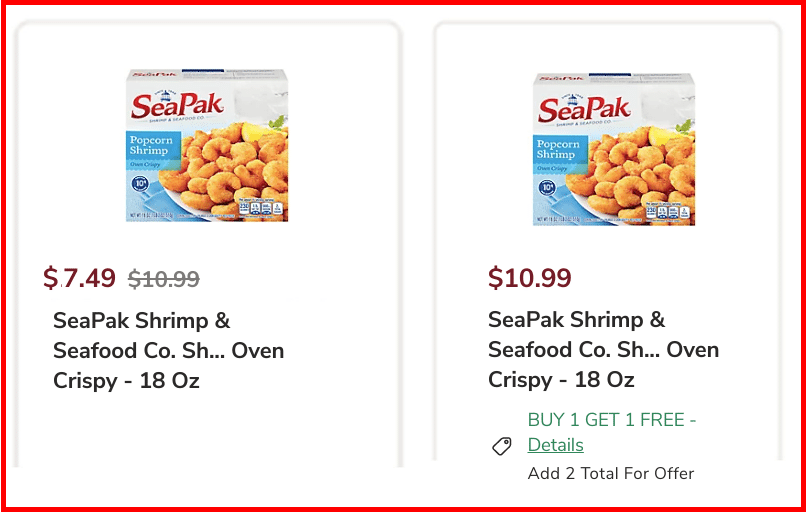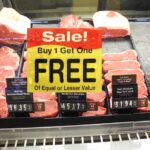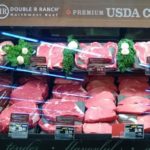
Is Safeway up to its old tricks in advertising bogus BOGOs? Or is a new lawsuit accusing Safeway of doing so itself bogus?
A Safeway shopper in Washington state has filed a lawsuit against the grocery chain and its parent company Albertsons, accusing them of “routinely increas(ing) the regular retail price of items when offering them in BOGO sales.”
Kim Siflinger of Silverdale, Washington describes herself as “a retiree who recently moved to Washington to be closer to her family” who “regularly look(s) for BOGO deals” in order to stretch her dollars while living on a fixed income.
Just look at the price of SeaPak boxed frozen shrimp earlier this month, as illustrated above in Siflinger’s complaint. On April 4, the product sold for $7.49. “The next day, Safeway offered the same product for $10.99 as part of a Buy 1, Get 1 Free sale,” the lawsuit points out.
What the lawsuit doesn’t point out is that the $7.49 price appeared to be a sale price, discounted that week from the regular price of $10.99. That’s a similar price for the same product that some of Safeway’s competitors charge. Typically, when products are offered as part of a buy-one-get-one-free sale, in order to get a second product for free, a shopper must first buy one product at its regular price. Previous sale prices for the first item wouldn’t apply, otherwise the store would be allowing shoppers to stack a promotion on top of a promotion.
The same appeared to be true for some other products mentioned in the lawsuit, including Gorton’s frozen fish and Green Mountain Coffee, which were once offered at a sale price when buying one, and later offered at full price as part of a BOGO deal.
The issue is what constitutes a “regular” price. Is the price you pay for the first item in a BOGO sale the actual retail price, or an artificially inflated price? According to Safeway’s website, if you buy a box of SeaPak frozen shrimp today, you’d pay $10.99 – the regular retail price.
Things can get murky, though, when it comes to items like meat and produce, the prices for which Safeway sets itself. How is one to know what the “regular” retail price is, if it seems to constantly change?
Back in 2021, Safeway settled a class action lawsuit in Oregon, reimbursing shoppers after admitting that it had inflated the regular prices of some meat products during BOGO promotions. Siflinger’s lawsuit alleges that Safeway is still doing the same in Washington.
Just last month, Siflinger says she bought BOGO chicken breasts priced at $5.99 per pound. “The price for the same item the day before Safeway put the boneless, skinless chicken breasts on BOGO promotion was $5.49 per pound and the boneless, skinless chicken breasts returned to that price immediately after the BOGO promotion ended,” the lawsuit states. Not only that, but the price earlier that month was $2.99 a pound – an even better deal than the $5.99 BOGO price.
Safeway’s “marketing and sale of BOGO products is immoral, unethical, oppressive, or unscrupulous” and in violation of the state’s Consumer Protection Act, the lawsuit alleges. “The BOGO products are not actually free,” but the promotion prompts shoppers to “pay more for the product and buy more of the product than they otherwise would in order to obtain the illusory ‘free’ product.”
The lawsuit seeks refunds and damages for all Safeway shoppers in Washington state who allegedly overpaid for BOGO products over the past four years.
It will be up to the judge to determine whether the lawsuit has any merit. Either way, let it be a lesson to keep an eye on your grocery store’s prices – both regular prices and sale prices. Because whether it’s due to deception or just legitimate marketing practices, BOGO deals may not always be the deal that they seem.










